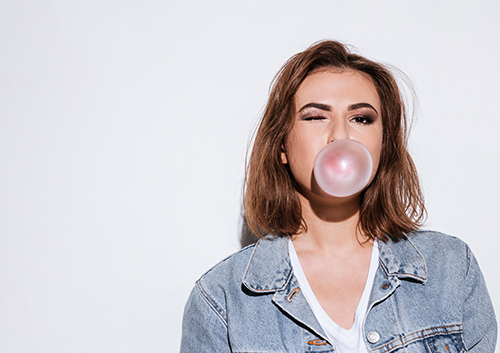Can You Chew Gum and Wear Braces?
June 16th, 2021

Well, of course you can chew gum and wear braces. But, should you chew gum and wear braces? That can be a sticky question.
For many years, the answer was a firm “No.” Not only did our favorite chewables literally gum up the (dental) works, but they were filled with loads of the sugar that cavity-causing bacteria love to feed on. The result? A much better chance of damage to your orthodontic work, and a higher risk of cavities near your brackets and wires.
But times, and gum recipes, change. Today’s sugar-free gum provides us with some new ideas to chew over.
- Sugarless gum is much less sticky than regular gum, so it is much less likely to stick to your appliance. If there is any chance that gum will damage your wires or brackets, we’ll let you know that it’s best to wait until your braces are off to indulge.
- Some orthodontic patients find that their jaws and ligaments are less sore if they chew gum for a few minutes after an adjustment.
- Most important, studies suggest that chewing sugarless gum might actually help prevent cavities from forming. How is that possible?
Because chewing gum increases our production of saliva! Okay, we don’t normally find saliva an exciting, exclamation-point-worthy topic, but let’s look at the dental benefits:
- Saliva washes away food particles and bacteria. And because braces can trap food when we eat, it’s great to have some help washing away any meal-time souvenirs.
- Saliva helps neutralize acids in the mouth. The acids found in foods and produced by oral bacteria lead to cavities, so diluting and neutralizing their effects provide important protection for our enamel.
- Saliva helps bathe the teeth in minerals that can actually rebuild weakened enamel. Acids in the mouth attack minerals in the enamel such as the calcium and phosphate that strengthen our teeth. Fortunately, saliva provides calcium, phosphate, and fluoride that can actually help rebuild weakened enamel.
So, should you chew gum and wear braces? The real question is, should you chew gum while you’re in braces? Dr. Douglas and Larry Harte and our team are more than happy to provide the right answer for you! Talk to us at your next visit to our Sparta or Livingston, NJ office about the potential benefits and drawbacks of dentist-approved sugarless gum. Depending on the kind of gum you choose and the kind of orthodontic work you are having done, the answer just might surprise you.





